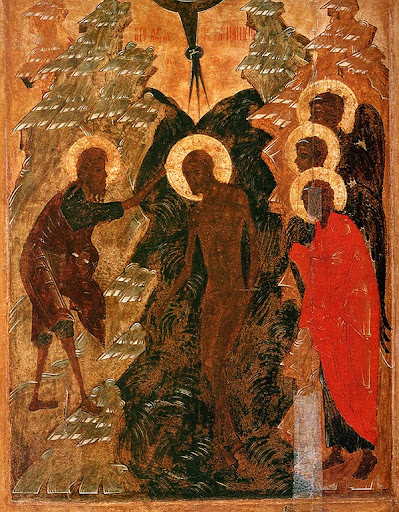Jesus Our Initiator
Dec 6
/
Michael Simmons

“Schism in the soul, schism in the body social, will not be resolved by any scheme of return to the good old days, […] Only birth can conquer death — the birth, not of the old thing again, but of something new.” - Arnold Toynbee A Study of History[1]
Our tendency with Advent is to look into the past for a way forward into the future, but Advent is first a death of our old ways, and a sobering invitation to the present. Here we wait, expectantly for Christ, for Immanuel, for God to be with us. We bring our longings, our wounds and our traumas, and whether we know it or not, we bring our expectations for One who will save us.
In the West, we love the metaphor and image of the hero. From Rocky Balboa to Luke Skywalker, from Cinderella to Moana, from Odysseus to Frodo, we are drawn toward the ones who lift great burdens onto their shoulders, overcome insurmountable odds, or move from humble beginnings to a place of honor. Is this not how we think of Jesus? The prophet Isaiah described the Messiah to come as a Wonderful Counselor, a Prince of Peace, a Mighty Father, and one on whose shoulders the government will rest (Isaiah 9:6-7).
It is safe to say that first-century Jews were expecting a king, a righteous warrior and a hero of sorts. This is not wrong, but this expectation may have become lifeless and inanimate. Our desire for a hero-God may be developmentally appropriate in one season, but likely not the next.
“only birth can conquer death — the birth, not of the old thing again, but of something new.”
Metaphors and the Divine
In Advent, we wait for a savior, a prince, a father, a ruler, which all speak metaphorically of the Transcendent Reality behind them. These metaphors impact how we relate to God. Do you call God a Counselor, King, Mother, Father or Savior? It must be noted that even the name “God” is a metaphor!
The original pronunciation for the Hebrew word YHWH was lost after Jews viewed this word for God as too holy to be said aloud. In the words of Catholic priest and author, Richard Rohr, “Some would say that the name of God literally cannot be ‘spoken,’ only breathed.”[2]
Mythologist and professor Joseph Campbell wrote that “the metaphors of one historically conditioned period … may not speak to the persons who are living long after that historical moment” […] formed through altogether different experiences.”[3] Scripture reveals the Word became flesh and dwelt among us (John 1:14), and the Word must be enfleshed in our time, in our historical moment, and incarnated in our metaphors.
Jesus Our Initiator
Jesus said many things to us. Things like, “No one can see the kingdom of God unless they are born again” (John 3:3). Or “I am the way and the truth and the life. No one comes to the Father except through me” (John 14:6).
These verses offer us images and the language of initiation. I define initiation as any process, ritual or life event whereby a person is transformed or begins a journey of transformation. Jesus’ entire life is one of initiation, and it is this life we are invited into. “Whoever wants to be my disciple must deny themselves and take up their cross and follow me” (Matthew 16:24).
Campbell wrote that initiation is “distinguished by formal, and usually very severe, exercises of severance, whereby the mind is radically cut away from the attitudes, attachments, and life patterns of the stage being left behind.”[4] Paul pens it this way, “Therefore, if anyone is in Christ, the new creation has come: The old has gone, the new is here” (2 Corinthians 5:17).
Truly, Jesus is both our Savior and our Initiator, but whereas salvation pulls us out of something, initiation draws us into something. We require both, but we are profoundly transformed into the image of Christ by experiences of loss, separation and disorientation. We need an Initiator who knows the path, who is The Path, a Good Shepherd, who walks with us in the shadows.
Our initiation in Advent appropriately separates us from the good old days of the past, as well as the glory we perceive to be our future, and invites us to live now in the present. Christ our Initiator stands ready to guide us toward new life, “not of the old thing again, but of something new.”
Reflection
What metaphor for God feels dead and lifeless to you? Is there a new metaphor bubbling up?
Where is life initiating you? What does the metaphor of Jesus as Initiator offer you?
True initiation requires that we enter the shadow-lands of our inner life to receive and companion what we've hidden, repressed or denied. A trail head to this inner landscape can be our emotions, which often surface in our relationships. Michael is offering his popular virtual course, Companioning Our Shadow: Emotions & Relationships on Friday February 18th from 9am-11am PST. If you're interested in connecting with Michael for spiritual direction, reach out to him at innerworkcommunity@gmail.com.
Notes:
[1] Arnold Joseph Toynbee, A Study of History (United Kingdom: Oxford University Press, 1939). 169-175
[2] Richard Rohr, The Naked Now: Learning to See as the Mystics See (John Garratt, 2009). 26.
[3] Joseph Campbell, Thou Art That: Transforming Religious Metaphor, ed. Eugene Kennedy (New World Library, 2013). 6.
[4] Joseph Campbell, The Hero With a Thousand Faces, 2nd edition (Princeton, NJ: Princeton University Press, 1968). 10, 12.

Michael Simmons
Michael is a spiritual director, shadow work facilitator, and writer. He is ordained in the Free Methodist Church, and holds a Doctor of Leadership from Portland Seminary. If you’d like to connect with Michael for spiritual direction or shadow work, visit Innerworkcommunity.org, or email him at innerworkcommunity@gmail.com. You can also check out his Patheos.com column, Transgressive Spirituality: Life Through the Lens of Jungian Psychology. Be sure to check out his latest work and upcoming courses here.

